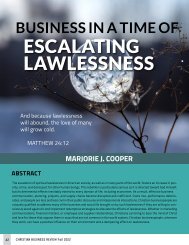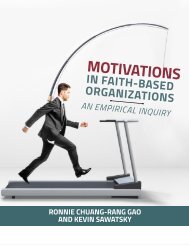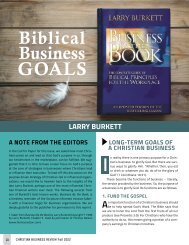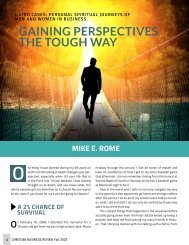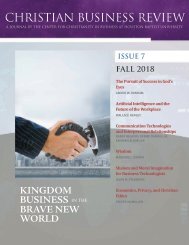Christian Business Review 2022: Pressing On Toward God's Goal
You also want an ePaper? Increase the reach of your titles
YUMPU automatically turns print PDFs into web optimized ePapers that Google loves.
BUSINESS IN A TIME OF LAWLESSNESS<br />
CBR PEER REVIEWED ARTICLES<br />
us. Incivility is a classic example of violation of the second<br />
commandment and thus qualifies as an overt expression of<br />
lawlessness. The workplace with its tensions and pressures<br />
can be an open opportunity for believers to exhibit graciousness<br />
and kindness (Gal 5:22-23) amidst these disruptions.<br />
Unfortunately, many <strong>Christian</strong>s respond in anger and<br />
frustration to various aspects of lawlessness, which is an<br />
understandable human response. However, the Lord’s people<br />
are called to evince a demeanor that owes its self-control<br />
to Someone greater than ourselves. We must go well beyond<br />
the natural human responses to external threats. Regrettably,<br />
the emotional tenor of discourse from <strong>Christian</strong>s in many<br />
business settings is frustration, aggression, and even retaliation,<br />
which constitute overt acts of lawlessness.<br />
In contrast, Paul writes in 2 Tim 2:24-26, “And the Lord’s<br />
bondservant must<br />
not be quarrelsome,<br />
but be kind to all,<br />
able to teach, patient<br />
when wronged,<br />
with gentleness correcting<br />
those who<br />
are in opposition, if<br />
perhaps God may<br />
grant them repentance<br />
leading to the<br />
knowledge of the<br />
truth, and they may<br />
come to their senses<br />
and escape from the<br />
snare of the devil,<br />
having been held captive by him to do his will.”<br />
The Lord himself tells us in Matt 5:44-45 to love our enemies<br />
and pray for those who persecute us. This is God’s clear<br />
command, that <strong>Christian</strong>s should not take a page from the<br />
lawlessness handbook, but rather than retaliating in kind, we<br />
should be sufficiently countercultural that the contrast is noticeable<br />
and appreciated.<br />
In cases where <strong>Christian</strong> businesspeople are criticized for<br />
their beliefs and ethical stands on various issues, there are<br />
ways to address lawlessness that does not inflame opposition<br />
and that shows the immense contributions that <strong>Christian</strong>ity<br />
makes to a culture. As an example, in the early days<br />
of the church, <strong>Christian</strong>s were often accused of terrible sins,<br />
such as gross immorality and incest, cannibalism, and engaging<br />
in traitorous acts against Caesar, to name but a few.<br />
The early apologists were those who spoke out and carefully<br />
presented true <strong>Christian</strong> beliefs and practices to a pagan<br />
world that not only misunderstood them but was disposed<br />
to persecute them for those “practices.” Justin Martyr, Tertullian,<br />
and Clement of Alexandria, for example, earnestly presented<br />
alternatives to the prevailing misinformation about<br />
<strong>Christian</strong>s, carefully reasoned and respectful towards the<br />
audiences to which these treatises were directed.<br />
The conduct of those early <strong>Christian</strong>s was also testimony<br />
to their superior contributions to the Roman Empire, as, for<br />
example, the extent to which <strong>Christian</strong>s cared for the sick.<br />
Devastating epidemics swept the Roman Empire in CD 165<br />
and again in 251. We can only speculate as to what diseases<br />
these were, although many suggest smallpox and measles.<br />
Estimates vary, but it is likely that a quarter to a third of the<br />
population died in the first epidemic and as many as 5,000<br />
a day were dying in<br />
Rome at the height of<br />
The fear of God is the opposite<br />
of each person doing what is right<br />
in her own eyes. Instead of being<br />
accountable to no one, people who<br />
fear God recognize their accountability<br />
to the transcendent judge, whose rule<br />
is both authoritative and essential for<br />
human well-being<br />
the latter epidemic. 22<br />
Dionysius of Alexandria,<br />
quoted by Eusebius,<br />
23 states that<br />
<strong>Christian</strong>s at the time<br />
viewed the epidemic<br />
as a time of “schooling<br />
and testing.” While<br />
many pagans fled the<br />
scene, the <strong>Christian</strong>s<br />
“heedless of danger,”<br />
took charge of nursing<br />
the sick and ministering<br />
to them in the<br />
name of Christ. Thus, the early <strong>Christian</strong>s inspire us with their<br />
articulate defense of the faith and their unselfish response<br />
to the needs of their pagan neighbors. <strong>Christian</strong> healthcare<br />
organizations, which today are primarily run as for-profit<br />
businesses, can offer similar efforts to alleviate suffering in<br />
addition to their for-profit products and services. This is the<br />
sort of mindset and sacrifice needed to offset spiritual lawlessness<br />
and to bring the healing and redemptive message<br />
of Christ to a world that views <strong>Christian</strong>s with increasing antipathy.<br />
CONTEMPORARY RESPONSES THAT<br />
REFLECT GODLY SACRIFICE<br />
<strong>Christian</strong> businesspeople have much to contribute to curbing<br />
lawlessness in ways that reflect their ambassadorship<br />
CHRISTIAN BUSINESS REVIEW Fall <strong>2022</strong> 472





